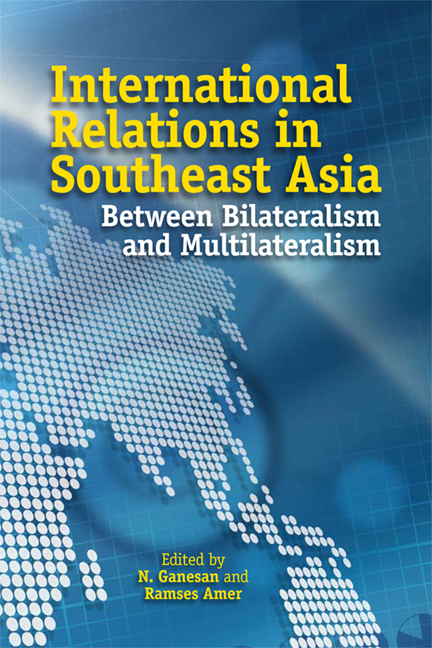Book contents
- Frontmatter
- Contents
- Preface
- List of Abbreviations
- Contributors
- Introduction
- Part I On International Relations
- Part II Case Studies — Mainland Southeast Asia
- Part III Case Studies — Maritime Southeast Asia
- 7 Malaysia-Indonesia Bilateral Relations: Sibling Rivals in a Fraught Family
- 8 Indonesia-Singapore Relations
- 9 Bilateralism and Multilateralism in Malaysia-Philippines Relations
- 10 Malaysia-Singapore Relations: A Bilateral Relationship Defying ASEAN-style Multilateralist Approaches to Conflict Resolution
- 11 Bilateral Relations between Indonesia and the Philippines: Stable and Fully Cooperative
- Conclusion
- Index
11 - Bilateral Relations between Indonesia and the Philippines: Stable and Fully Cooperative
from Part III - Case Studies — Maritime Southeast Asia
Published online by Cambridge University Press: 18 November 2017
- Frontmatter
- Contents
- Preface
- List of Abbreviations
- Contributors
- Introduction
- Part I On International Relations
- Part II Case Studies — Mainland Southeast Asia
- Part III Case Studies — Maritime Southeast Asia
- 7 Malaysia-Indonesia Bilateral Relations: Sibling Rivals in a Fraught Family
- 8 Indonesia-Singapore Relations
- 9 Bilateralism and Multilateralism in Malaysia-Philippines Relations
- 10 Malaysia-Singapore Relations: A Bilateral Relationship Defying ASEAN-style Multilateralist Approaches to Conflict Resolution
- 11 Bilateral Relations between Indonesia and the Philippines: Stable and Fully Cooperative
- Conclusion
- Index
Summary
Unlike bilateral relations between Indonesia and Malaysia or Indonesia and Singapore, there has been no “hot or big issues” between Indonesia and the Philippines. In other words, since the establishment of diplomatic relations between Indonesia and the Philippines on 24 November 1949, the two countries' bilateral relations have never undergone any turbulence. Perhaps the only strained issue in the two countries' bilateral relations happened during the late 1950s, when U.S. Military Bases in Subic and Clark were used by U.S. President Eisenhower's administration to undertake Central Intelligence Agency clandestine military operations to support the Pemerintahan Semesta (Permesta) secessionist rebellion in Sulawesi from 1957 to 1959.
The foundation of bilateral relations between Indonesia and the Philippines was initially set up in the 1950s by top leaders of the two countries through personal arrangements, mutual courtesy visits, or meetings of senior officials. In order to strengthen the bilateral relationship, the two countries signed several agreements, most of them related to border management, such as the Treaty of Friendship signed in Jakarta on 21 June 1951, Immigration Agreement between the Government of the Republic of Indonesia and the Government of the Republic of the Philippines signed in Jakarta on 4 July 1956, followed by Joint Directives and Guidelines of Implementation of the Agreement signed in Manila on 14 September 1965, Exchange of Notes on 31 January 1966, The Implementing Rule and Regulation on the Border Crossing on 1 July 1975, Agreement on Border Trade between the Government of the Republic of Indonesia and the Government of the Republic of the Philippines signed on 1 August 1974, and Agreement on Defence and Security Cooperation between the Government of the Republic of Indonesia and the Government of the Republic of the Philippines in 1997.
The change of governments both in Indonesia and the Philippines have never changed cordial and fully cooperative relations between the two countries in handling issues related to border crossing, undocumented Indonesian nationals in the Philippines, or transnational crime. Indonesia and the Philippines have a history of helping each other in solving separatist pressures and problems.
- Type
- Chapter
- Information
- International Relations in Southeast AsiaBetween Bilateralism and Multilateralism, pp. 287 - 310Publisher: ISEAS–Yusof Ishak InstitutePrint publication year: 2010

